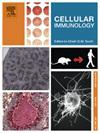Arctiin suppress Th17 cells response and ameliorates experimental autoimmune uveitis through JAK/STAT signaling
IF 2.9
4区 医学
Q2 CELL BIOLOGY
引用次数: 0
Abstract
Conventional treatments for autoimmune uveitis, such as corticosteroids and systemic immunosuppressants, often result in adverse side effects, prompting the need for therapies targeting specific molecular pathways. This study investigates the effects of Arctiin, known for its diverse biological properties, on experimental autoimmune uveitis (EAU) through its action on Th17 cells and the JAK/STAT signaling pathway. Our findings reveal that Arctiin significantly alleviates EAU by reducing clinical scores, inflammatory cell infiltration, and levels of inflammatory cytokines like IL-17 and TNF-α in the eye. Arctiin achieves this by activating adiponectin receptor 1 (AdipoR1), which modulates the JAK/STAT pathway, thereby inhibiting Th17 cell differentiation and cytokine secretion. Additionally, Arctiin effectively suppresses IRBP-specific Th17 cell activation in cervical lymph nodes, further mitigating retinal inflammation and tissue damage. These results underscore Arctiin's potential as a therapeutic agent for uveitis and other autoimmune inflammatory disorders through the modulation of the AdipoR1/JAK/STAT pathway in Th17 cells.
牛蒡子素抑制Th17细胞反应,通过JAK/STAT信号通路改善实验性自身免疫性葡萄膜炎。
自身免疫性葡萄膜炎的常规治疗方法,如皮质类固醇和全身免疫抑制剂,通常会导致不良副作用,这促使需要针对特定分子途径的治疗。本研究通过对Th17细胞和JAK/STAT信号通路的作用,研究以其多种生物学特性而闻名的牛蒡子苷对实验性自身免疫性葡萄膜炎(EAU)的影响。我们的研究结果表明,牛蒡子素通过降低临床评分、炎症细胞浸润和炎症细胞因子如IL-17和TNF-α的水平显著缓解EAU。牛角苷通过激活脂联素受体1 (AdipoR1)来调节JAK/STAT通路,从而抑制Th17细胞的分化和细胞因子的分泌。此外,牛蒡子苷有效抑制颈淋巴结中irbp特异性Th17细胞的活化,进一步减轻视网膜炎症和组织损伤。这些结果强调了Arctiin通过调节Th17细胞中的AdipoR1/JAK/STAT通路作为葡萄膜炎和其他自身免疫性炎症疾病治疗剂的潜力。
本文章由计算机程序翻译,如有差异,请以英文原文为准。
求助全文
约1分钟内获得全文
求助全文
来源期刊

Cellular immunology
生物-免疫学
CiteScore
8.20
自引率
2.30%
发文量
102
审稿时长
30 days
期刊介绍:
Cellular Immunology publishes original investigations concerned with the immunological activities of cells in experimental or clinical situations. The scope of the journal encompasses the broad area of in vitro and in vivo studies of cellular immune responses. Purely clinical descriptive studies are not considered.
Research Areas include:
• Antigen receptor sites
• Autoimmunity
• Delayed-type hypersensitivity or cellular immunity
• Immunologic deficiency states and their reconstitution
• Immunologic surveillance and tumor immunity
• Immunomodulation
• Immunotherapy
• Lymphokines and cytokines
• Nonantibody immunity
• Parasite immunology
• Resistance to intracellular microbial and viral infection
• Thymus and lymphocyte immunobiology
• Transplantation immunology
• Tumor immunity.
文献相关原料
公司名称
产品信息
索莱宝
a protein phosphatase inhibitor cocktail
 求助内容:
求助内容: 应助结果提醒方式:
应助结果提醒方式:


